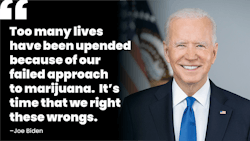
More provisional business licensees are coming online in Mississippi’s medical cannabis program.
State officials recently outlined licensing figures and other updates for the state’s medical cannabis industry during an Oct. 27 press conference.
Kris Jones Adcock, director of the Mississippi Medical Cannabis Program, said the state has issued provisional licenses to 47 cultivators, 138 dispensaries, eight processors, three waste disposal businesses, two testing labs and four transporters. As of Oct. 3, Mississippi had announced 38 cultivation provisional approvals, according to Memphis, Tenn., NBC affiliate Action News 5.
Additionally, Adcock said Mississippi’s medical cannabis program now has 406 patients, 117 practitioners who can provide medical cannabis recommendations, and 491 work permits for people to work in the cannabis industry. The state had approved 367 work permits with 50 in processing as of Oct. 3, per Action News 5.
Adcock and two other state officials—Dr. Dan Edney, Mississippi’s state health officer and a physician, and Jim Craig, senior deputy and director of health protection at the Mississippi State Department of Health—said state officials are working diligently to prevent product from being diverted to the illicit cannabis market.
“We’re not going to be able to get that to zero,” Edney said of diversion. “But we’re getting it as low as we can through our regulatory authority based on the statutory conditions that we’re given …. I have full confidence that we’re doing more than a reasonable job of protecting against diversion, and we will continue to do the very best of our ability.”
Additionally, Edney said a planned increase in government office hires will allow additional support from the state.
Craig indicated that completely stamping out product diversion to the illicit market may be possible, stating that “this is a very important role for us in the health department, in the regulatory space, to ensure patients’ safety and to minimize and/or eliminate potential diversion.”
Edney said Mississippi’s planned timeline has been for products to enter dispensaries in January 2023. Adcock said dispensaries could start selling products as soon as late December 2022.
But before sales begin, Adcock said numerous cannabis businesses have requested technical assistance from the state for them to become fully compliant with regulations, and the state can review business’s standard operating procedures in the provisional license period.
As Cannabis Business Times reported Oct. 28, Mississippi regulators disciplined cultivator Mockingbird Cannabis because the business allegedly used hoophouse structures that defy state statute. Mississippi officials stated the business must destroy $1 million worth of plants and temporarily halt operations until it makes structural improvements at one of its sites, according to Mississippi Today.
Adcock explained during the press conference that structures used for growing must have enclosed roof structures, permanent walls and solid foundations.
“Nothing has gone without a blemish,” Adcock said. “People do have questions. They do have compliance issues, and we work through those compliance issues, and those onsite visits really give us an opportunity to do that.”
During the press conference, Adcock took a question from reporter who said the number of patients (406) seems low and asked if that is because of a low number of practitioners (117).
Adcock said the law states that practitioners have 60 days to provide written certifications to patients after those patients apply. Additionally, she said for a patient to be eligible to receive a medical cannabis recommendation from a practitioner, they must have an established relationship. (The statute explains that the practitioner must have treated or consulted with the patient and have assessed their medical history and current physical and mental health in person.)
Edney said he became a certified practitioner who can recommend cannabis and has been educating other physicians about the medical program.
“As I’m speaking around the state and I’m talking to practitioners about the cannabis program, there are a lot of them that are still sitting on the fence and not sure what they want to do,” Edney says. “They want to make sure it’s not going to impact their overall practice. And as I have a thoughtful conversation with them, most of them see the value of a thoughtful decision between a physician or provider and their patient about another tool in the toolbox to try to alleviate pain and suffering, or other symptoms. And as I talk with them, they’re more reassured."

























